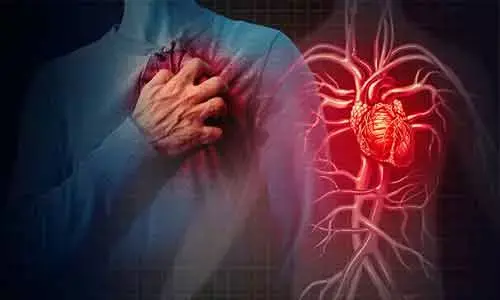- Home
- Medical news & Guidelines
- Anesthesiology
- Cardiology and CTVS
- Critical Care
- Dentistry
- Dermatology
- Diabetes and Endocrinology
- ENT
- Gastroenterology
- Medicine
- Nephrology
- Neurology
- Obstretics-Gynaecology
- Oncology
- Ophthalmology
- Orthopaedics
- Pediatrics-Neonatology
- Psychiatry
- Pulmonology
- Radiology
- Surgery
- Urology
- Laboratory Medicine
- Diet
- Nursing
- Paramedical
- Physiotherapy
- Health news
- Fact Check
- Bone Health Fact Check
- Brain Health Fact Check
- Cancer Related Fact Check
- Child Care Fact Check
- Dental and oral health fact check
- Diabetes and metabolic health fact check
- Diet and Nutrition Fact Check
- Eye and ENT Care Fact Check
- Fitness fact check
- Gut health fact check
- Heart health fact check
- Kidney health fact check
- Medical education fact check
- Men's health fact check
- Respiratory fact check
- Skin and hair care fact check
- Vaccine and Immunization fact check
- Women's health fact check
- AYUSH
- State News
- Andaman and Nicobar Islands
- Andhra Pradesh
- Arunachal Pradesh
- Assam
- Bihar
- Chandigarh
- Chattisgarh
- Dadra and Nagar Haveli
- Daman and Diu
- Delhi
- Goa
- Gujarat
- Haryana
- Himachal Pradesh
- Jammu & Kashmir
- Jharkhand
- Karnataka
- Kerala
- Ladakh
- Lakshadweep
- Madhya Pradesh
- Maharashtra
- Manipur
- Meghalaya
- Mizoram
- Nagaland
- Odisha
- Puducherry
- Punjab
- Rajasthan
- Sikkim
- Tamil Nadu
- Telangana
- Tripura
- Uttar Pradesh
- Uttrakhand
- West Bengal
- Medical Education
- Industry
Guidelines to treat non-ST-segment elevation ACS released at ESC Congress 2020

Sophia Antipolis, France: One in five patients die within a year after the most common type of heart attack. European Society of Cardiology (ESC) treatment guidelines for non-ST-segment elevation acute coronary syndrome are published online today in European Heart Journal, and on the ESC website.
Chest pain is the most common symptom, along with pain radiating to one or both arms, the neck, or jaw. Anyone experiencing these symptoms should call an ambulance immediately. Complications include potentially deadly heart rhythm disorders (arrhythmias), which are another reason to seek urgent medical help.
Treatment is aimed at the underlying cause. The main reason is fatty deposits (atherosclerosis) that become surrounded by a blood clot, narrowing the arteries supplying blood to the heart. In these cases, patients should receive blood thinners and stents to restore blood flow. For the first time, the guidelines recommend imaging to identify other causes such as a tear in a blood vessel leading to the heart.
Regarding diagnosis, there is no distinguishing change on the electrocardiogram (ECG), which may be normal. The key step is measuring a chemical in the blood called troponin. When blood flow to the heart is decreased or blocked, heart cells die, and troponin levels rise. If levels are normal, the measurement should be repeated one hour later to rule out the diagnosis. If elevated, hospital admission is recommended to further evaluate the severity of the disease and decide the treatment strategy.
Given that the main cause is related to atherosclerosis, there is a high risk of recurrence, which can also be deadly. Patients should be prescribed blood thinners and lipid lowering therapies. "Equally important is a healthy lifestyle including smoking cessation, exercise, and a diet emphasising vegetables, fruits and whole grains while limiting saturated fat and alcohol," said Professor Jean-Philippe Collet, Chairperson of the guidelines Task Force and professor of cardiology, Sorbonne University, Paris, France.
Behavioural change and adherence to medication are best achieved when patients are supported by a multidisciplinary team including cardiologists, general practitioners, nurses, dietitians, physiotherapists, psychologists, and pharmacists.
The likelihood of triggering another heart attack during sexual activity is low for most patients, and regular exercise decreases this risk. Healthcare providers should ask patients about sexual activity and offer advice and counselling.
Annual influenza vaccination is recommended – especially for patients aged 65 and over – to prevent further heart attacks and increase longevity.
"Women should receive equal access to care, a prompt diagnosis, and treatments at the same rate and intensity as men," said Professor Holger Thiele, Chairperson of the guidelines Task Force and medical director, Department of Internal Medicine/Cardiology, Heart Centre Leipzig, Germany.
Reference: 2020 ESC Guidelines for the management of acute coronary syndromes in patients presenting without persistent ST-segment elevation. European Heart Journal. 2020. https://academic.oup.com/eurheartj/article-lookup/doi/10.1093/eurheartj/ehaa575
Hina Zahid Joined Medical Dialogue in 2017 with a passion to work as a Reporter. She coordinates with various national and international journals and association and covers all the stories related to Medical guidelines, Medical Journals, rare medical surgeries as well as all the updates in the medical field. Email: editorial@medicaldialogues.in. Contact no. 011-43720751
Dr Kamal Kant Kohli-MBBS, DTCD- a chest specialist with more than 30 years of practice and a flair for writing clinical articles, Dr Kamal Kant Kohli joined Medical Dialogues as a Chief Editor of Medical News. Besides writing articles, as an editor, he proofreads and verifies all the medical content published on Medical Dialogues including those coming from journals, studies,medical conferences,guidelines etc. Email: drkohli@medicaldialogues.in. Contact no. 011-43720751


